We Aim To Be Masters In Paint, Polish & Protect- Sharad Malhotra
- By T Murrali
- December 18, 2020
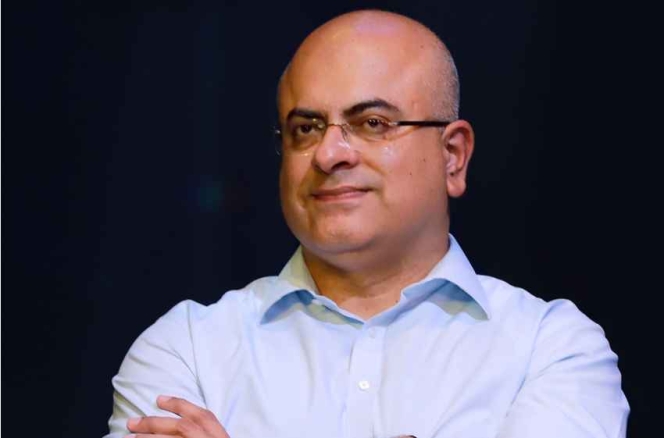
Q: Globally, the car care market is bigger than the automotive aftermarket for paints. How is it in India. What is your current share in car care business and how do you plan to enhance it?
Malhotra: Car Care business is a new domain for us and we are just starting out. Globally and in India too, this is a large business area with potentially a larger market size than automotive aftermarket for paints. We are studying this business and working out our strategy. We will be offering our car care products as a product solution, through online and other channels, and as a service directly by us and our partners as well. This is an exciting area and you will soon see us becoming more visible.
Q: Your intent was to become a solutions partner, expanding into different areas like car care etc. Can you update on this journey?
Malhotra: We see ourselves emerging as a total solutions partner for customers, with car care encompassing refinishing of the paint as well. We call ourselves an augmented Finishing solutions company so our purpose is to provide excellent, unmatched finishing solutions for any surface, including cars.
This positions us quite uniquely in the market as no other player will be able to integrate paint into the car care proposition.
 Q: Following car care technologies from the parent company in Japan may not be helpful as the geographical conditions are different in India. How do you customise it? Is your Indian R&D helping it?
Q: Following car care technologies from the parent company in Japan may not be helpful as the geographical conditions are different in India. How do you customise it? Is your Indian R&D helping it?
Malhotra: While we leverage the knowledge and technology developed by our parent and sister companies, we essentially follow the market requirement. So we are in terms of technology and developments. We make for India, make in India and provide our solutions across India. That is how we operate.
For the automotive aftermarket business, our R&D set up in India is quite extensive and well resourced. Our technology centre in Manesar serves us well – both for the Indian market and as a key resource for the global business. This is where we do bulk of our developments – whether for paints or car care products.
Q: Till few years ago ceramic coating was popular in India. What is the current trend and how do you cater to the every changing customers’ expectations?
Malhotra: Ceramic coating is still quite popular but there are other products available too for the consumer. Our approach is to use our knowledge of surfaces and surface coatings to create unique and differentiated products for our customers. In this respect, we are developing new technologies. One of the unique products we have in this space is our CyGlaz clearcoat 9905 which creates a very strong film that far exceeds the performance of any normal coating or even a ceramic coating. So, there is a lot more in our kitty and we will soon be launching such products and services.
Q: What is Nippon’s USP? What are the compelling reasons for customers to look for NPI?
Malhotra: Every company tries to build its own compelling solution. Our differentiation comes from our widespread dealer network, our presence in over 1,000 towns in India, our unique products and services, our amazing sales and service team, our embracing of new ideas and platforms, our willingness and ability to customise, our short TAT between concept to creation and many more things. And all this stems from our unique DNA which makes us Nippon Paint. And this DNA is what makes us click across Asia Pacific and makes us the force that we have become.
The automotive aftermarket space is relatively very new for Nippon Paint and it is only in 2014 that we started focusing on this space as a separate, identified international business. So all that we have created is only in a short period of five to six years as compared to our illustrious competitors who have decades of legacy and knowledge. But I also feel that our freshness and ideas are helpful to give us a different perspective of the industry and emerging opportunities our uncluttered mind gives us speed to execute.
Q: Tell us about the Velocity Repair System; how many outlets are functional now and what the target for the next five years?
Malhotra: When we launched our Velocity Repair programme, there were not too many takers for it. Now, people who have used this product swear by it and use it extensively. In the first round, we focused on creating branded Nippon Paint Xpress Centres and set up around 50 such centres across India. Now, we take the product proposition across the country and make it available to all our major partner workshops. So, we have around 300 active users for this product line in India at this moment.
Our product proposition is still fresh and no competitors have been able to develop a similar system. In the future, we will continue to expand this portfolio and workshop network and take this to over 1,000 outlets. The key idea is for the car owner and not just the repair centre to experience this service and that’s what we are working on now.

Q: The secondary car market is always larger than the primary market and it is growing even bigger with the pandemic induced used-car sales. What kind of opportunity does this give you?
Malhotra: We are actively focused on the used car market and are working with leading used car players on the refurbishment side of things. Our solutions which give fast, efficient and high quality repairs make us the ideal paint partner for such used car companies and we are leveraging that capability.
In this field, we are also working on the concept of providing painting services and not just paint. Going forward, we see the refurbishment business relating to our used car customers growing into a very sizeable part of our business.
Q: What are the challenges NPI faced during the lockdown and COVID induced New Normal?
Malhotra: Several challenges; and we used this period to innovate. We relooked at our customer propositions. We developed and launched new products. We created new services. We set up new manufacturing concepts. We distributed our manufacturing from a single core to multiple units. We streamlined our supply chain. We localized more products and raw materials. We trained our workforce. We sharpened our optimisation focus. We developed new digital solutions. We empowered our managers. We cut our fat and become more lean and flexible. And yes, we didn’t forget our social responsibility and supported the painter community at this turbulent time.
So, in that sense, Covid-19 has been a great accelerator for us. Things that would have normally been done in a few years have been accomplished in a few months.
Q: What is the current status of the imported parts and accessories in India after the ban on imports from China? Does it anyway help affect you?
Malhotra: The paint industry has a fair share of raw materials and finished goods coming from China. At our side, we are not overly dependent on sourcing our products from China and more so, now our supply chain is more localised than ever. Yes, certain products sourcing from non-China sources is challenging but we are looking ahead at more localization and more diversified sourcing.
Q: With the life of automotive paints increasing due to technological advancements, how is the revenue being sourced nowadays?
Malhotra: We always aim to provide customers with more durable products. Our business is not impacted by the life of paint, but by the differentiation of the solutions that we offer. Our primary business in the aftermarket relates to collision repair which is not dependent on life but repair of paint due to accidents. Furthermore, as we expand into new products and new domains like wood coatings, car care, bus and application vehicles painting and light industrial coatings, our dependency even on collision repair induced paint consumption is also going down.
We always say – give the customer the best products and services and he will refer more customers to us. Give him a shoddy product with poor durability, we will shoot ourselves in the foot. So, we are absolutely clear that technology induced advancement of paint durability will always stand us in good stead.
Q: Can you tell us about your short-term and long-term plans?
Malhotra: In the short term, our plan is to utilise the learnings from the Covid induced lull to our advantage. As mentioned before, we have done a lot of things that will now help us. So, we will leverage these developments, regain our business and be back on growth. To that extent, October 2020 has been a good month where we were back on double digit growth and that gives us the satisfaction that we are back on track.
From the longer term perspective, the lockdown period has helped us to develop an alternative view about our business approach. We aim to be masters in Paint – Polish – Protect and we will be focusing on the various dimensions of this new strategy in the next two to three years. We are here to stay. And we are future ready. (MT)
- January 2026
- sales
- Hero MotoCorp
- TVS Motor Company
- Royal Enfield
- B Govindarajan
- Eicher Motors
- Mahindra & Mahindra
- Tata Motors Passenger Vehicles
- Hyundai Motor India
- Toyota Kirloskar Motor
- JSW MG Motor India
- Kia India
- Tarun Garg
- Nalinikanth Gollagunta
- Atul Sood
- Tata Motors Commercial Vehicles
Indian Automotive Sector Starts 2026 With Robust January Wholesales Growth
- By MT Bureau
- February 01, 2026

The Indian automotive industry has commenced the 2026 calendar year on a high note, with automakers across two-wheeler, passenger vehicle and commercial vehicle segments reporting significant YoY wholesale growth for January. The performance reflects a resilient domestic market and a burgeoning recovery in international exports.
The two-wheeler sector saw massive volume gains, spearheaded by Hero MotoCorp, which recorded dispatches of 557,871 units, marking a robust 26 percent growth compared to 442,873 units in January 2025. This performance marks the company’s 25th consecutive year of market leadership. TVS Motor Company followed with a 30 percent increase in domestic two-wheeler sales, reaching 383,262 units, while its electric vehicle (EV) wing grew by 50 percent to 37,756 units.
Royal Enfield achieved a significant milestone, surpassing 1 million year-to-date sales in just 10 months, posting January sales of 104,322 motorcycles – a 14 percent YoY increase, which includes 93,781 units in the domestic market and 10,541 units exported.
B. Govindarajan, Managing Director, Eicher Motors and CEO, Royal Enfield, said, "The new year has begun on a positive note for Royal Enfield – extending the strong momentum from the previous quarter and marking four consecutive months of healthy double-digit growth. We have crossed 1 million motorcycle sales in this financial year across the globe and also crossed 100,000 motorcycle sales in exports."
In the passenger vehicle (PV) segment, Mahindra & Mahindra reported a 25 percent growth in utility vehicles, selling 63,510 units domestically. Tata Motors Passenger Vehicles saw a dramatic 47.1 percent rise in total sales (including EVs) to 71,066 units.
Hyundai Motor India achieved its highest-ever monthly domestic sales of 59,107 units, up 9.5 percent, while Toyota Kirloskar Motor registered 30,630 units, representing a 17 percent YoY growth. Kia India also started the year strong with 27,603 units, a 10.3 percent increase and JSW MG Motor India grew 9 percent with 4,843 wholesale units.
Honda Cars India reported domestic wholesales of 6,193 units and 748 units in exports. These figures follow a January 2025 performance where the company registered 7,325 domestic units and 4,979 units in exports.
The current sales volume is supported by demand for the Honda Amaze, alongside steady contributions from the City and Elevate models.
Tarun Garg, MD & CEO, Hyundai Motor India, said, "January 2026 marks a defining chapter in Hyundai Motor India’s journey. Achieving our highest-ever monthly domestic sales of 59,107 units... reflects not only Hyundai’s brand leadership but also the collective strength of our people, partners and customers."
Nalinikanth Gollagunta, CEO, Automotive Division, Mahindra & Mahindra, said, "Building on the strong momentum of last year's performance, we began the year on a strong note in January... On 14th January, we opened bookings for XUV7XO and XEV 9S clocking 93,689 bookings for a booking value of INR 205 billion - a record-breaking milestone in just 4 hours."
Atul Sood, Senior Vice-President, Sales & Marketing, Kia India, said, "The encouraging start to 2026 reflects the continued trust customers place in the Kia brand. The positive response to the new-generation Seltos, steady demand for the Sonet, and growing popularity of the Carens Clavis and Clavis EV, underline the strength and balance of our portfolio."
Kunal Behl, Vice President, Marketing & Sales, Honda Cars India Ltd, said: “The year has begun on a strong note, supported by a healthy sales momentum. The Honda Amaze continues to bring in strong demand for its value for money offering along with the City and Elevate that contribute steadily to the overall business. We remain confident of sustaining this positive momentum in the coming months.”
The commercial vehicle (CV) sector also demonstrated strength, particularly in heavy and light cargo segments. Tata Motors reported total CV sales of 38,844 units, up 29.1 percent from 30,083 units in the previous year. Within this, Heavy Commercial Vehicle (HCV) trucks saw the sharpest rise at 41.2 percent. Mahindra’s domestic CV sales grew by 22 percent to 27,656 units, driven largely by the LCV 2T–3.5T category.
Union Budget 2026-27: Supply Chain Resilience, Infra Push To Drive Auto Industry Growth
- By MT Bureau
- February 01, 2026
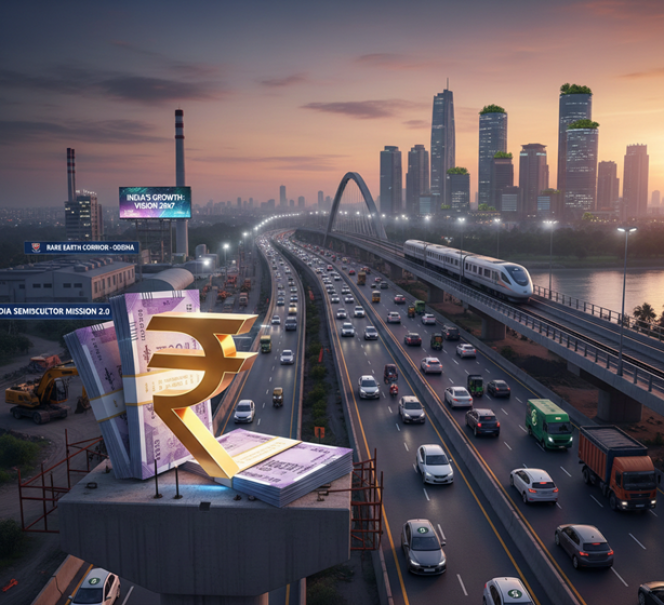
In a strategic pivot from direct consumer subsidies to foundational supply-chain resilience, the 2026-27 Union Budget, presented by Finance Minister Nirmala Sitharaman, focuses on bolstering the structural integrity of the Indian automobile industry.
A cornerstone of this year’s fiscal policy is the massive infrastructure and logistics push, highlighted by the development of the Dankuni-Surat Dedicated Freight Corridor and the operationalisation of 20 new national waterways. These initiatives, alongside a coastal cargo promotion scheme aiming to double the share of waterway freight to 12 percent by 2047, are designed to drastically lower logistics costs and ease the movement of components across the country.
Simultaneously, the government is reinforcing the industry's backbone by establishing a INR 100 billion SME Growth Fund to provide long-term capital for auto-component MSMEs, while enhancing liquidity through the Trade Receivables Discounting System (TReDS) and easing regulatory hurdles via ‘Corporate Mitras’ in Tier-II and Tier-III cities.
To secure the future of high-tech mobility, the Budget further expands the India Semiconductor Mission (ISM 2.0) to include domestic equipment manufacturing and chip IP, while nearly doubling the allocation for the Electronics Components Manufacturing Scheme to INR 400 billion. This technological drive is matched by a robust commitment to the electric vehicle (EV) ecosystem, specifically through the creation of ‘rare earth corridors’ in Odisha, Kerala, Andhra Pradesh and Tamil Nadu. These hubs will provide plug-and-play ecosystems to insulate the industry from global mineral volatility and supply curbs. Complementing this is a series of customs duty exemptions on capital goods used for lithium-ion cell manufacturing and critical mineral processing, which is expected to drive down battery costs and encourage local gigafactory expansion. Finally, for the clean energy segment, the full excise duty exemption on the biogas portion of blended CNG offers immediate relief to fuel prices, marking a comprehensive effort to foster a self-reliant, sustainable, and cost-competitive automotive landscape in the wake of previous GST reforms.
Motul Charts Future Of Mobility With Advanced Fluids At SIAT Expo 2026
- By MT Bureau
- January 31, 2026
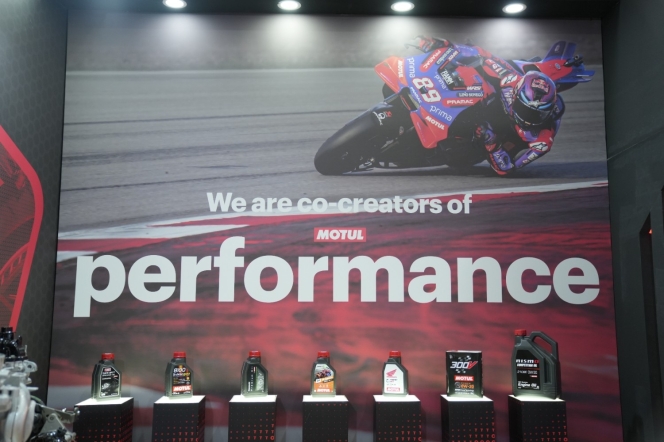
Motul India presented a comprehensive vision for the future of automotive fluids at SIAT Expo 2026, centred on innovation, sustainability and supporting the industry’s technological transition. The company’s exhibition was built around the event’s core theme of pioneering safe and sustainable mobility, demonstrating a strategic commitment to evolving alongside new vehicle architectures.
A cornerstone of this vision is the development of fluids for new propulsion systems. A keynote address by Dr Julien Plet, Global Head of R&D, elaborated on the critical role of innovative fluids for next-generation mobility. The company showcased its E-Gen series, engineered for the thermal management of electric vehicle components like motors, batteries and power electronics, positioning it as a critical solution for evolving electrified mobility. Simultaneously, for alternative fuels, Motul presented specialised lubricant formulations for hydrogen internal combustion engines, reflecting early and active research into diverse energy sources. This dual focus underscores a readiness to support the industry’s broad technological transition.
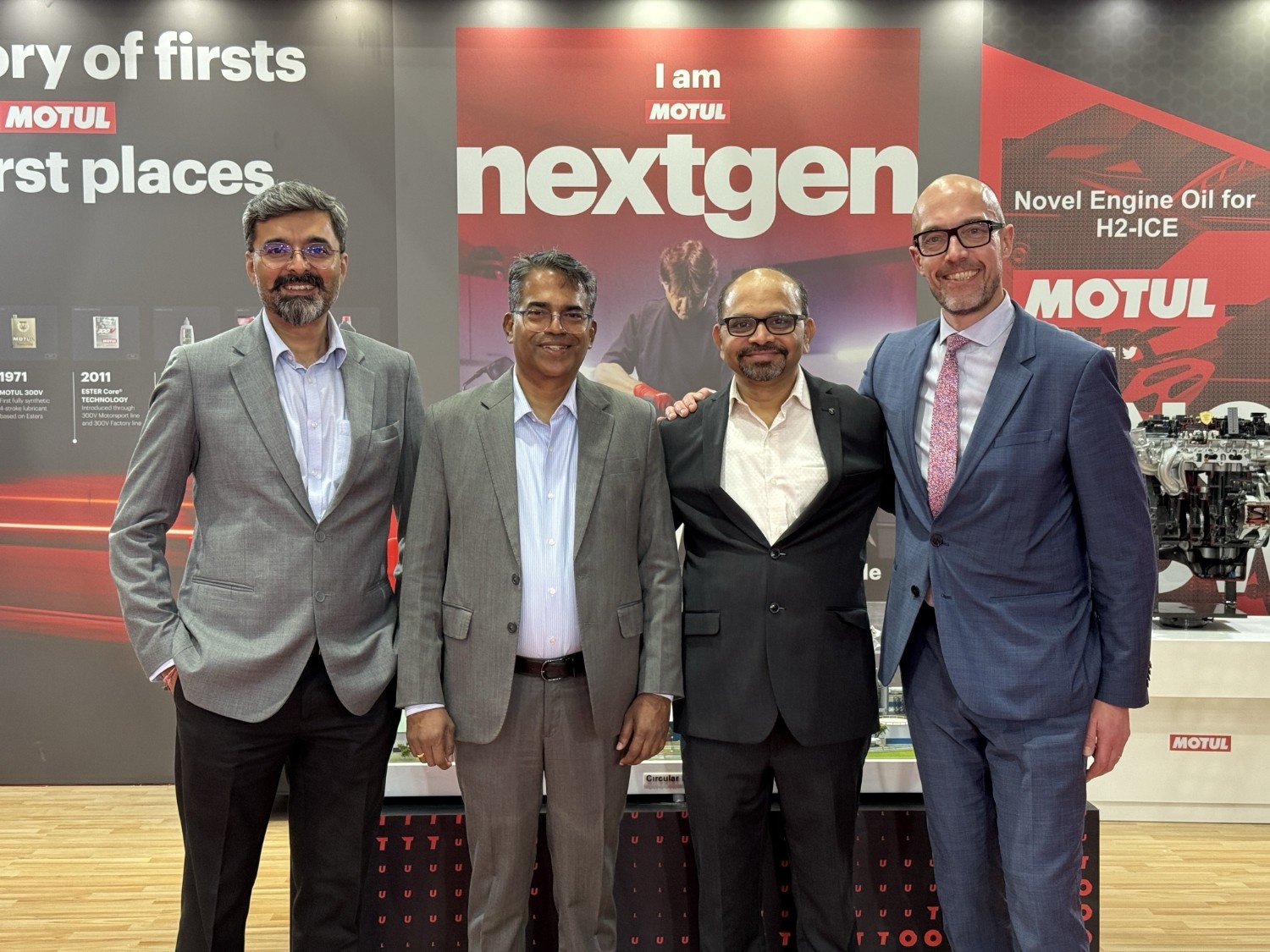
Further solidifying its technical credibility, Motul emphasised its race-to-road development philosophy. The exhibit featured OEM-validated products, including a lubricant with formal Mercedes-Benz approval and another born from collaboration with Toyota Racing Development. These examples illustrate how the company leverages the extreme demands of motorsport as a dynamic proving ground for future commercial technologies, rather than for immediate market launch.
Integral to its presentation was a strong sustainability narrative, exemplified by the NGEN lubricant range. This product line utilises base oils derived from re-refined materials, embodying circular economy principles and a long-term commitment to reducing environmental impact through responsible resource use.
Ultimately, by participating in the expo, Motul India reinforced its role as an innovation-led partner to the automotive ecosystem. With a robust global research backbone and deep industry relationships, the company showcased its structured approach to developing high-performance, sustainable fluids tailored to meet the specific demands of the Indian market as it advances.
Dr Plet said, “Motul’s research and development teams across geographies continue to focus on advancing lubricant performance for existing powertrains while developing technologies aligned with future mobility needs and local market conditions.”
Nagendra Pai, CEO, Motul India & South Asia, said, ‘’SIAT Expo is a key platform for future mobility, and Motul is proud to showcase its global innovation strength in India. By combining advanced technologies with local adaptability, Motul is ready to lead solutions across electrification, sustainability and alternative fuels.”
India-EU Ink Historic Trade Deal To Reshape Global Automotive Landscape
- By Nilesh Wadhwa
- January 27, 2026
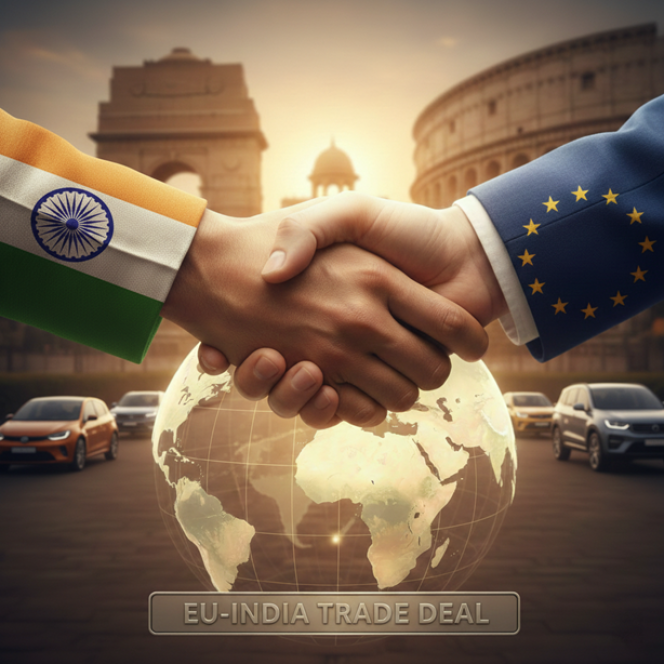
In a move that signals a seismic shift in global trade dynamics, the European Union and India today concluded negotiations for a historic and ‘commercially significant’ Free Trade Agreement (FTA). As the largest deal ever brokered by either side, the pact creates a massive free trade zone encompassing 2 billion people and the world's second and fourth largest economies.
While the agreement spans sectors from agriculture to pharmaceuticals, it is the automotive industry that stands as the centrepiece of this industrial realignment.
Cracking the 110% tariff wall
For decades, European automakers have struggled against India’s formidable trade barriers. Under the new agreement, these hurdles are set to crumble. India has committed to a radical reduction in car tariffs, which currently sit at a staggering 110 percent. According to the official release, these duties will be gradually slashed to as low as 10 percent.
Furthermore, the deal provides a massive boost to the automotive supply chain. Tariffs on car parts – a critical sector for European manufacturers – will be fully abolished within a 5-to-10-year window. This move is expected to integrate Indian and European manufacturing hubs more closely than ever before.
European Commission President Ursula von der Leyen hailed the deal as a milestone for rules-based cooperation. "The EU and India make history today. We have sent a signal to the world that rules-based cooperation still delivers great outcomes," she said.
With a population of 1.45 billion and a GDP of EUR 3.4 trillion, India is currently the world’s fastest-growing large economy. This FTA grants European carmakers and industrial firms a ‘privileged access’ that no other Indian trading partner currently enjoys.
Beyond the finished vehicles, the deal addresses the broader industrial ecosystem:
- Machinery & Chemicals: Tariffs of up to 44 percent on machinery and 22 percent on chemicals will be mostly eliminated.
- SME Support: Dedicated contact points will be established to help smaller European component manufacturers navigate the Indian market.
- Intellectual Property: The agreement guarantees high-level protection for designs and trade secrets, providing the legal certainty required for high-tech automotive transfers and R&D investment.
The deal is not merely about volume; it is about the future of mobility. A dedicated chapter on trade and sustainable development focuses on climate change and environmental protection.
To support India’s transition toward sustainable industrialisation – a move critical for the electric vehicle (EV) sector – the EU intends to provide EUR 500 million in support over the next two years. Additionally, a new EU-India platform for climate action cooperation is slated to launch in early 2026, likely serving as a catalyst for joint ventures in green hydrogen and battery technology.
The EU expects the deal to double its goods exports to India by 2032, saving European businesses approximately EUR 4 billion per year in duties.
The path to implementation now moves to the legal and political stage. The negotiated texts will undergo legal revision and translation before being presented to the European Council and the European Parliament for consent. On the Indian side, the agreement will move toward formal ratification.
After nearly two decades of stop-and-start negotiations – beginning in 2007 and relaunching in 2022 – the road is finally clear for a new era of Euro-Indian industrial synergy.







Comments (0)
ADD COMMENT